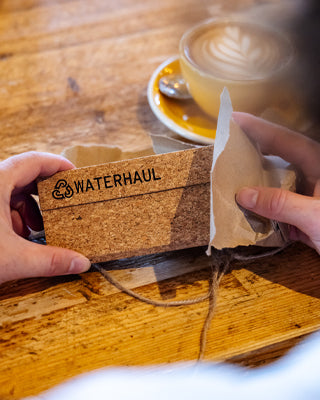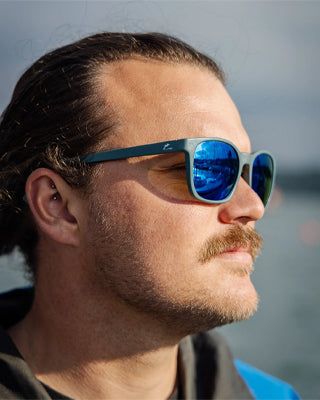Net Missions: Boscastle Expedition
WATERHAUL STORIES

DRAGGING FILTHY, STINKING FISHING NETS ACROSS BEACHES ON A GREY, DRIZZLY WEEKEND IN MARCH ISN'T FOR EVERYONE, BUT FOR WATERHAUL, IT'S AN ADVENTURE WITH A PURPOSE.
In March, the UK experienced the highest spring tides of the year, and with it, a wave of ocean plastics across our coastline. Spurred on by these extreme tides, the team at Waterhaul embarked on a 3-day expedition to North Cornwall, searching for washed-up ghost fishing gear; the most harmful and abundant form of ocean plastic, to recover and recycle.
Every year, it’s estimated that at least 640,000 tonnes of plastic fishing gear is lost or discarded in our oceans. Known as ‘ghost’ fishing, these nets and lines then continue to catch and kill marine life, which in turn attracts even more species, resulting in an ongoing loop of catches. Thanks to the durable, high-quality plastics used to make the fishing gear, these nets and lines can persist in our oceans for over 500 years without degrading, before eventually washing up on our shores.

Basing ourselves in Boscastle, we covered over 20 miles of beaches, coves and caves between Trebarwith and Bude. The team scoured remote sections of the coastline, scaling some of Cornwall’s tallest cliffs and even abseiling to gain access to some locations, to recover enough ghost gear to push the limits of our 8’ x 5’ trailer.
The mission went down as follows:
DAY 1 - LOCATE

Our first day started with a list of beaches and coves we had researched and deemed likely to have ghost gear on. The rugged and rocky landscape along this stretch of coast is perfect for snagging nets and lines; anchoring them in place to prevent them from being swept back out with the tides.
Splitting into three teams to cover more ground, we set off, armed with OS maps, litter-picking equipment for plastics we encountered along the way, and beach-cleaning knives for freeing snagged lines.


Prior to the trip, a few members of the local litter-picking communities had reached out to us with locations of ghost gear they had already found and dragged out of reach from the waves, so recovering these deposits was our first port of call. We collectively recovered several dumpy bags full of ghost gear, as well as plenty of general litter, and one of the teams discovered a larger, partially buried tangle of nets at Millook Haven that needed some more hands to tackle.
DAY 2 - RECOVER

Day two started at Boscastle Harbour, where we had arranged to meet a local fisher who had contacted us regarding end-of-life fishing gear that they wanted to see put to better use than landfill. With the full team getting their hands dirty, we loaded up our van with piles and piles of polypropylene potting lines; previously used to tie lobster and crab pots together. Our knives came in particularly handy here to cut these massive lengths of rope into more manageable sections!


The afternoon saw us return to Millook Haven, to recover the fishing net that had been spotted the previous day. On our arrival, we had a real ‘tip of the iceberg’ moment, with only a few feet of net visible amongst the pebbles, however, a bit of digging soon revealed the extent of the problem. This piece of ghost gear was a perfect demonstration of the power of the ocean, with what turned out to be around 300 square foot of fishing net buried under the shingle, and wrapped tightly around the rock formation.


After an hour of digging through the shingle by hand, untangling the sections of net that could be untangled, and cutting through the snagged sections, we freed the nets, and dragged our trophy across the beach and bundled it into the van.
DAY 3 - ADVENTURE

Worn out by the hard work and distances covered the previous days (as well as a lively evening at The Cobweb pub the night before!), we took a more relaxed approach to our final day of hunting, and packed our headtorches, wetsuits and bellyboards to explore the coves and caves at Lundy Bay.


With the sun emerging at last, we scrabbled down the rocks to the sandy shoreline, and began exploring the caves. Caves are one of our favourite places to hunt for ghost gear, as you never know what you’ll find jammed into them, with this one being no exception. Wedged into the ceiling right at the mouth of this cave was a large knot of various pieces of coloured rope, complete with buoys dangling in the breeze, and further back we found more chunks of rope that were so frayed it was clear they had been at sea for a long time.
Finally, we took to the sea with our bellyboards for some fun in the waves, before setting off home for Newquay, smelling pretty strongly of fishing nets! The fishing gear collected from this trip will be sorted into polymer (plastic) type, washed and processed, ready to be recycled.

Founded in Cornwall in 2018, Waterhaul is a social enterprise run by a group of frustrated surfers, marine conservationists and ocean enthusiasts who were growing tired of seeing our beloved coastlines, both in Cornwall and further afield, inundated with ghost gear.
We utilise this strongest form of plastic in our oceans to produce exceptional recycled sunglasses and eyewear that represent our vision for a cleaner ocean. Eyewear that meets the technical demands of adventure, features the most premium-quality glass optics available on the market and is embedded with a story of positive action for the ocean.
10% OFF YOUR FIRST ORDER
Join our NETwork for events, all things ocean conservation and exclusive private sale launches

